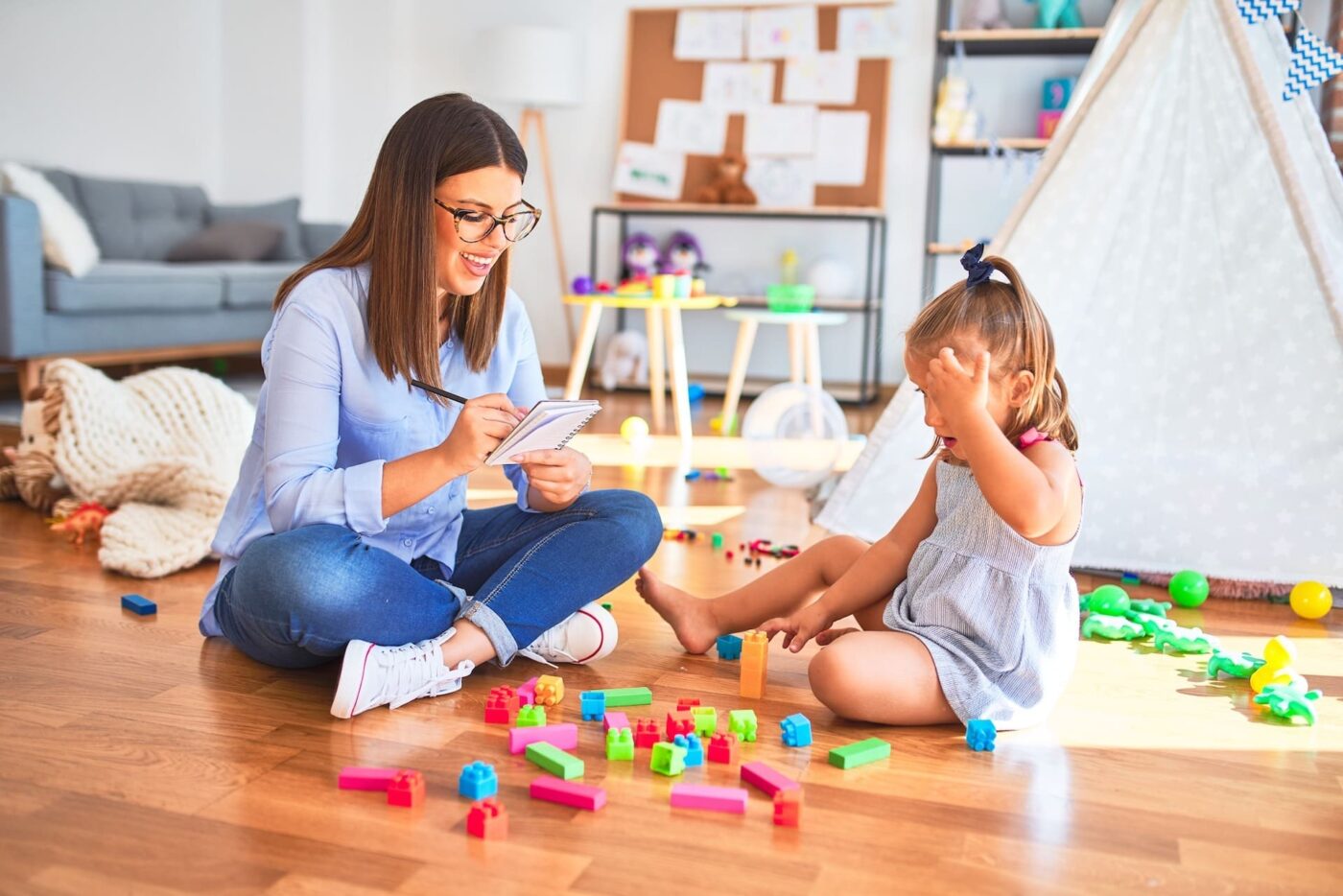Research shows that Applied Behavior Analysis (ABA) therapy is the most effective form of autism treatment. To help individuals with autism learn new skills and minimize problem behavior, ABA therapy is often carried out in multiple locations, including in-home therapy. To help you better understand in-home therapy and if it’s right for your child with autism, Trumpet created a comprehensive guide to in-home therapy. Read on to learn when in-home services are recommended, benefits of ABA therapy, and more.
READ MORE: Home-Based vs Center-Based Therapy
When Is In-home ABA Therapy Recommended?
When a child starts autism therapy at Trumpet, our Board Certified Behavioral Analysts provide therapy recommendations including frequency and locations of treatment. Treatment location is an important part of designing a customized ABA plan. According to a brief released by the California Association for Behavior Analysis, the setting of care should match an individuals’ treatment goals. By using multiple treatment settings, individuals with autism have more opportunities to learn different skills and generalize them to new environments. This is why home-based services are often recommended in conjunction with center-based services. By incorporating in-home services into your child’s autism therapy plan, your child can practice applying important skills across all aspects of their life.
What Are The Benefits Of In-home ABA Therapy?
In-home ABA therapy provides a natural environment for children to gain and practice skills. In-home therapy is a great choice for teaching independent living skills, such as personal hygiene, as well as strengthening social skills with family and close friends.
An in-home ABA therapy format also allows Trumpet therapists to:
1. Work With Siblings of Children With Autism
Including siblings into ABA therapy can help children with autism strengthen their social skills and their sibling bond. Depending on the child’s needs, they may practice playing with their siblings, sharing, and even daily interactions like sitting down to a family dinner.
2. Involve Parents And Family Members
In-home ABA therapy helps parents and caregivers take a more active role in their child’s autism treatment. Parents can watch and learn during the sessions, which can help you better understand how to support your child’s skill development. Even close family members, like grandparents, aunts, and uncles, can get involved. Together, family members can learn more about ABA strategies and begin to practice skills outside of ABA Therapy sessions.
3. Build Skills With Friends
To help your child with autism grow their social skills, Trumpet’s ABA therapists can involve neighborhood friends, school friends, or other family friends in therapy sessions. This allows children to practice social skills with the peers they interact with most. As your partner in autism treatment, Trumpet works with families to give suggestions on how to set up these playdates and maximize learning in a natural way.
Is In-home ABA Therapy Effective For Toddlers?
Research shows that early intervention is key in changing a toddler’s developmental trajectory. Our therapists work on age- and skill-appropriate behaviors to help toddlers learn important skills. Depending on your toddler’s needs, they may practice toilet training, getting dressed, and eating meals with family. Our therapists can also work on problem behaviors occurring in the home and train caregivers on how to implement the treatment outside of therapy sessions.
What Do School-Age Children Do During In-home Therapy?
Trumpet customizes every therapy plan to meet each child’s specific needs, so your child’s focus area may be unique. Many school-age children often practice social skills during in-home ABA therapy sessions. By practicing with parents, siblings, and family friends, children can develop social skills in a very natural environment, which can help them generalize skills to the classroom, community events, and other situations.
Is In-home ABA Therapy Appropriate For Teens And Adolescents?
The home environment is a great location for teens and adolescents to learn life skills. This may look like learning how to prepare their own meals, how to make doctor’s appointments, how to manage their time, and even practice interview skills.
How Can Families Prepare For Their First In-home ABA Service?
Starting in-home ABA therapy can be an adjustment. From deciding where the session should take place, to getting your child to stay in one room for the session, you’ll have to make a lot of decisions. Trumpet’s therapists have the training to provide high-quality services in every location and can help you along the way.
To make the first few sessions as smooth as possible, follow these tips:
- Choose a dedicated therapy space: Look through the rooms in your home to find a specific space your therapist can work in. Whether you choose an office, playroom, or other location, a dedicated space can help your child focus on the new skills they’re learning.
- Give the therapist an idea of what your child likes to do: Share certain toys and activities that your child loves with your team. During the session, your therapist can use them as reinforcement.
- Create a consistent schedule: Make sure your child knows what to do when the therapist is there. Review this routine before every in-home session.
- Ensure a responsible adult is home: Trumpet requires that an adult is present throughout the session. Many families’ grandparents or babysitter comes over for the session. If it works best to have your child receive therapy in alternating homes, our therapists can accommodate.
- Let your therapist take the lead: Trumpet’s therapists have experience in providing home-based services. Never hesitate to ask your therapist questions. Our team is happy to provide advice on how to prepare for your child’s in-home therapy session.
In-home therapy is a great way to help children of all ages generalize skills and practice new things in a familiar environment. To find out how in-home therapy could support your child, contact us today or view our in-home service areas.
